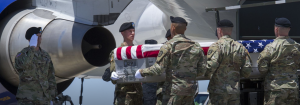America’s Other Endless War: Battling al-Shabaab in Somalia
The death of Staff Sgt. Alex Conrad puts into sharp relief the cost of the U.S.’s long fight against the militant group.
The U.S. commandos careened between grief and anger as Alex Conrad’s flag-draped coffin was hoisted onto the cargo plane. Al-Shabaab militants allied with al Qaeda had killed Staff Sgt. Conrad at a rudimentary outpost that American Green Berets built with help of the Somali army. Now, just as Sgt. Conrad’s comrades were sending him on his final trip home, they were grappling with more bad news. The Somali army had abandoned the outpost hours after the sergeant died. The Green Beret commander frantically called a senior Somali official. “We lost lives there,” the Green Beret said. “It’s not acceptable to give it back.” America’s war against al-Shabaab is one of the longest-running conflicts in U.S. history, simmering quietly for a dozen years in the desert landscape of the Horn of Africa. It has proven a frustrating mission with wins but no victory, setbacks but no defeat. Its limitations were apparent just this week, when al-Shabaab claimed responsibility for an 18-hour siege that left at least 21 victims—including one American—and five attackers dead at a hotel-and-office complex in Nairobi, Kenya. Somalia is one in a series of American wars unleashed by the Sept. 11 attacks, from Afghanistan and Syria to Niger and Yemen. On any given day, across a swath of Africa, South Asia and the Middle East, hundreds of U.S. troops might find themselves dropping bombs on or exchanging gunfire with any number of armed Islamist organizations—al-Shabaab, Islamic State, the Taliban, the Haqqani network and al Qaeda’s branches in the Maghreb or the Arabian Peninsula.
More From The Wall Street Journal (subscription required):




















